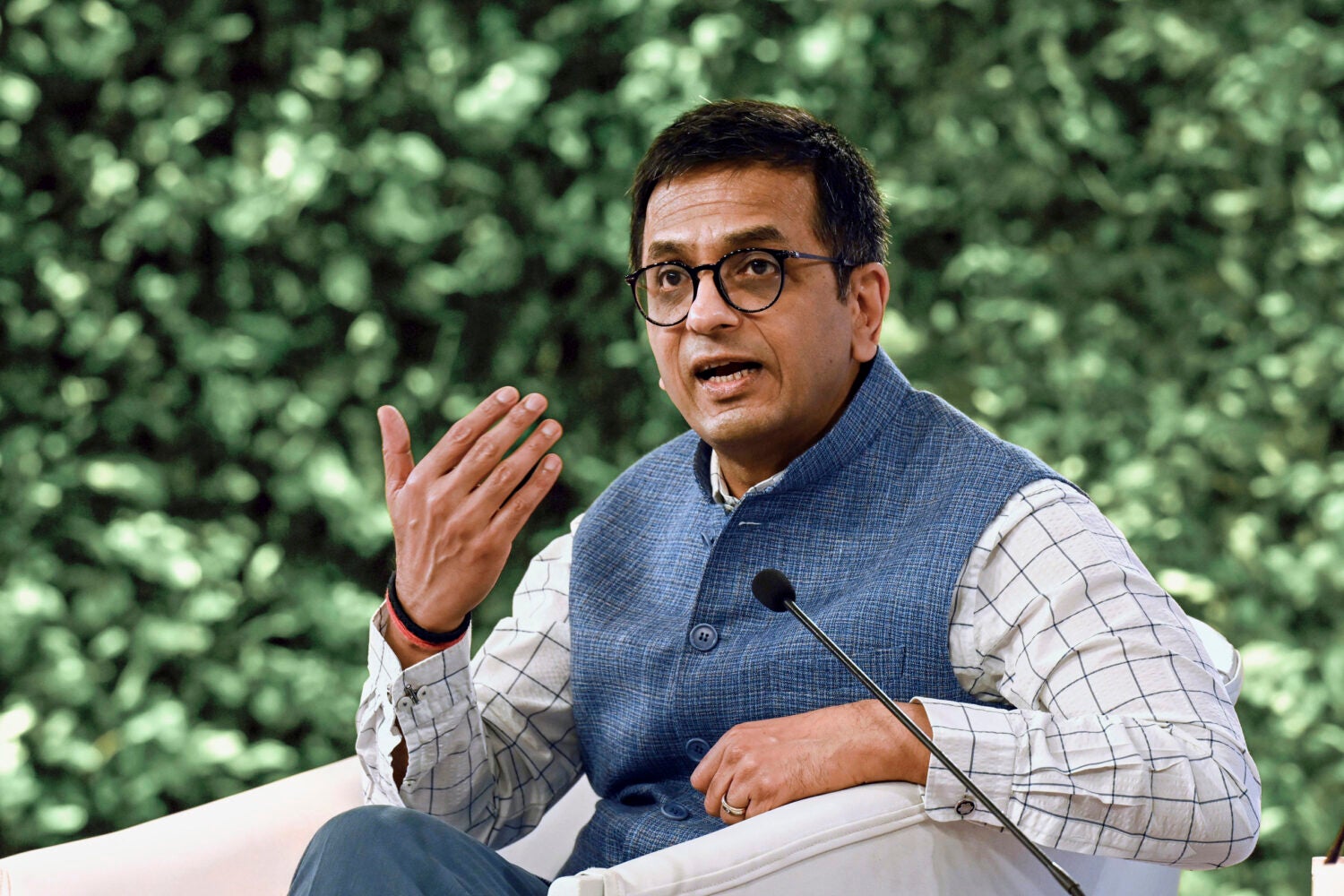Dhananjaya Y. Chandrachud LL.M. ’83 S.J.D. ’86 wanted to study at Harvard Law to broaden his knowledge of the law and its relationship to other disciplines such as history and political science. He also had a personal reason. His father, who was then chief justice of the Supreme Court of India, encouraged him to study abroad rather than practice law in India to avoid the possibility of gaining an unfair advantage because of his father’s position. By the time Chandrachud returned to India after his graduate studies and a stint at a U.S. law firm, his father had retired.
“I came back to the profession in India at a time when I had to stand on my own feet and then succeed in the open marketplace for legal services,” he said. “In that sense, it was harder than it could have been, but I think it was more satisfying as a result.”
This may be especially true because Chandrachud has reached the pinnacle of the legal profession in his country: He has become, like his father, chief justice of the Supreme Court of India.
He has put his own stamp on the supreme court, with rulings that broaden women’s and privacy rights as well as his support for initiatives to livestream cases to the public and translate judgments into multiple languages spoken in India.
His tenure “has been characterized by a tireless commitment to justice, innovation, and inclusivity,” said Anurag Bhaskar LL.M. ’19, who served as Chandrachud’s law clerk and is now deputy registrar of the supreme court.
Though he followed in his father’s footsteps, Chandrachud has called himself an “accidental lawyer.” He had planned to pursue a career in economics and enrolled in the Delhi School of Economics. His classes there happened to start later in the semester than the law courses at Delhi University, so he attended some law classes while he waited. And he soon realized that the law was his calling.
That decision was reinforced at Harvard Law, which, he said, “completely reshape[d] my values, my approach to the law, thinking about the law.” Last year, he returned to campus to accept Harvard Law School Center on the Legal Profession’s Award for Global Leadership. As a student, he was exposed to “amazing teachers” such as Laurence Tribe ’66 and Arthur von Mehren ’45 in classes on constitutional law and conflict of laws, respectively. In addition, through writing his thesis on affirmative action policies, he had occasion to consider carefully this important and hotly contested issue, concluding that their use is compatible with a strong commitment to meritocracy.
He benefited from the experience of working in the United States at a time, he says, when there were few lawyers from India practicing in U.S. firms. But Chandrachud always knew he would return to India, both to support his aging parents and to contribute to his home country. There he gained substantial courtroom experience as a solo practitioner and taught constitutional law before he was appointed a judge on the Bombay High Court in 2000, then chief justice of the Allahabad High Court in 2013. He was elevated to the supreme court in 2016 and is now the longest-serving judge in India.
India’s Supreme Court seats more justices (34) and handles substantially more cases (about 52,000 last year, part of a large backlog of cases at all court levels in India) than its counterpart in the United States. Like the U.S. Supreme Court, it rules on many legal questions with major societal implications. That includes cases in which Chandrachud has supported the right of free speech for the media and protesters; women’s access to military and religious institutions; and protection from sexual harassment. In another case, the court struck down as unconstitutional a law criminalizing adultery — a decision, he wrote in a concurring opinion, “to ensure that patriarchal social values and legal norms are not permitted to further obstruct the exercise of constitutional rights by the women of our country.” In a minority opinion in another case, he asserted that same-sex couples should be allowed to form civil unions.
“Our constitution has a defining vision of a gender-equal society.”
“Our constitution has a defining vision of a gender-equal society,” he said. “And gender is not just in binary terms but having a society which is equal for all gender affiliations and sexual orientations.”
Chandrachud’s perspective has been shaped through exposure to people of all backgrounds and by his wife, whom he calls “an amazing feminist.” Justices must follow the constitution, he says, but also keep an open mind and learn from other people.
“It goes beyond just a theoretical understanding of the constitution into understanding the real lived experiences of human beings,” Chandrachud said. “That’s when you put yourself in their shoes and understand where they come from. If you don’t do that, you’re constantly only evaluating them, as opposed to putting yourself in their position and understanding law in life from their perspective.”
In India, justices must retire upon reaching age 65, which for him will be the end of 2024. His goals for his remaining time on the court include reducing the case backlog and building a more diverse judiciary. In retirement, he hopes to teach and pursue hobbies like music. Most importantly, he wants to do what he has always tried to do: “give back to society and share all that I’ve received from being a citizen of our nation and hopefully make our society a little better place to live in.”
